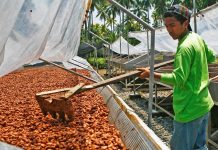Davao’s colorful history gets a meaningful entry with the launching of the Davao Food Terminal, the first trading post in Mindanao, hopefully this August.
The structure is a dream come true for a region that first hit upon the idea of a trading post in the 1980s. With its completion, the P70 million facility hopes to provide a direct market for this region’s vegetable and fruit and banana growers and producers.
“The facility is meant to help the farmer get the most of his products and to prevent him from getting the raw side of the deal with traders,” said Leo Brian D. Leuterio, officer-in-charge of the Davao City Agriculture Office.
He said that aside from providing a much-better venue for vegetable trading, the trading post will ensure quality packaging, selection and measurement.
Leuterio said the terminal will be run initially by the City government until such time that the Vegetable Industry Council of Southern Mindanao is in a position to help run the facility.
VICSMIN officials said they have come up with an entirely “Davao system” on how to operate the facility as compared to its counterparts in Sariaya, Quezon and in La Trinidad, Benguet.
The Davao Food Terminal’s first building is located on a 3,700-sq. m. lot inside the former Davao Ramie Textile (Daratex) complex not far from the Daliao Fish Landing.
Construction of the first structure is now 100 percent complete as early as December 2017 at the cost of P70 million, according to Regional Director Ricardo Onate Jr. of the Department of Agriculture Region 11.
The food terminal center is a joint project of the Davao City government and the DA and was started during the time of then Mayor and now President Rodrigo R. Duterte through a memorandum of agreement signed on July 30, 2015.
The food terminal center is within a five-hectare area owned by the National Development Corporation and was formerly occupied by the defunct Daratex mill.
It will cater to farmers and the agribusiness sector not only of Davao city but also to the region. Region.
Among local officials who worked on the project were Councilor Marissa S. Abella and the late councilor Leonardo Avila III, according to Agnes Cecilia S. Roble, senior agriculturist of the DA agribusiness and marketing assistance division.






